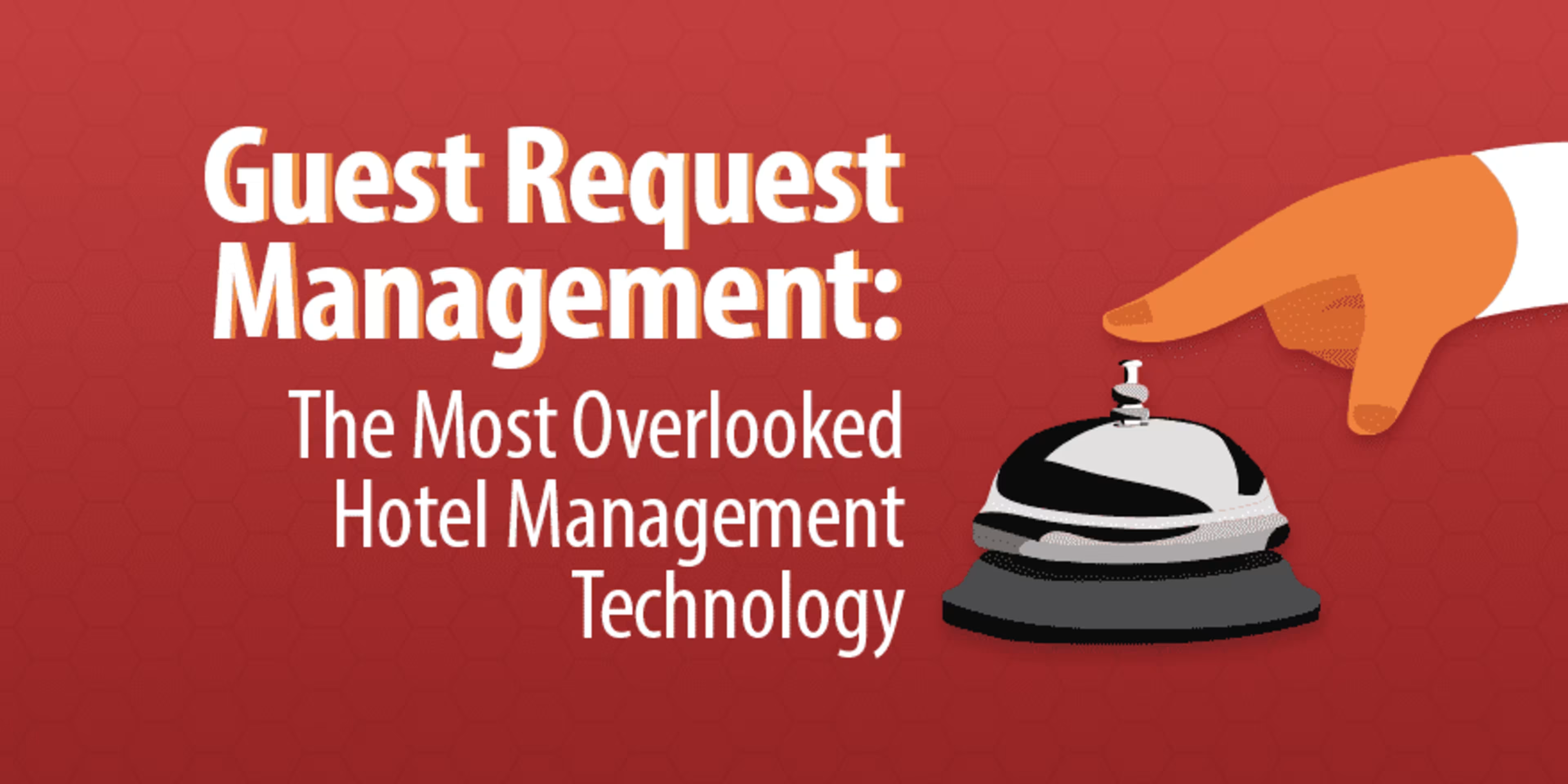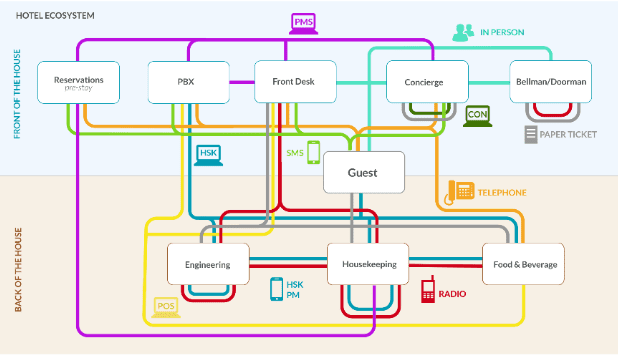Guest request management, or as some call it, guest experience management, is an important part of hotel management because it underpins guest service. Yet hotels often fail to prioritize it with the right technological tools.

As digital communication channels have proliferated, guest request management has become commensurately more complex.
Guests can request services, information or amenities in person, over the phone, by email, mobile app, or social media. Text messaging or other messaging services also add complexity and challenges for the staff at the end of these messages.
The Importance of Guest Request Management
With TripAdvisor growing in importance to hotel bookings, hotels are under a microscope like never before. Guests are evaluating service in real-time, with rankings having a direct bearing on ADR. Before, a hotel’s marketing department focused on distribution and content to support a brand’s image. They could do this without minding the day-to-day operations of each individual property. Yet in today’s environment guest-generated content on blogs and review sites drives bookings. This content focuses heavily on the experience in-stay. This means hotels are under more pressure than ever before to align the brand’s image with its service delivery at the property level. Effective guest request management, which is the foundation of service delivery, is thus core to this new paradigm.
So too, trends in consumer technology raise the stakes for guest request management. The general accessibility of mobile technology is changing how we communicate. We are shifting away from phone calls and turning to mobile apps and messaging platforms. On top of this, the expectations set by consumer platforms are consistently raising the service bar for companies in all sectors. “Technologies like Uber, Amazon and Opentable drive guest expectations,” said ALICE’s President Alex Shashou. “When you have exposure to superlative technology at home, how can you accept less from your hotel?”
One main expectation that is getting consistently reinforced is transparent fulfillment. There is an expectation that modern businesses will have clear end-to-end integrations. On Uber you can watch your driver approach you. On Amazon you can see the package make its way from the warehouse to your doorstep. Guests now expect the same type of transparency from all other interactions. This kind of integrated transparency is difficult for hotels to match. How can a guest know whether they have time to shower if they don’t know how long they are waiting for room service?
Today, this potential disappointment is a strategic risk for hotel owners. Guests can complain about their experience in real-time and across many digital platforms. These include TripAdvisor, Google, Yelp, and the OTAs. Hotel reviews typically focus on the guest’s experience in-stay. This is precisely where hotels are lagging in technology. The impact of reviews can also have a significant impact on revenue. Cornell University found that if a hotel increased its review score by just 1 point, it could increase prices. And it could do this without sacrificing occupancy or market share.
The Status Quo of Guest Requests
Request management was already challenging before the rise of digital communication.
This is because the hotel staff member who receives the request is almost always not the employee who will execute it. When a guest comes by the front desk to ask for an immediate room cleaning, it is not the front desk agent who will be cleaning the room. Similarly, when a guest calls for in-room dining, it is not the employee receiving the request who will cook the food or deliver it to the room.
Multi-person chains of communication and shift changes challenge guest request management. This is especially the case when the hotel is relying on analog communication tools. The latter are surprisingly prevalent. Many hotel employees currently rely on radios, pagers and even pen and paper. According to a 2015 survey from Software Advice, 25% of U.S. hoteliers still use pen and paper to manage their entire properties. Another 16% of respondents said they had no system at all (aka 100% manual).
"Manual communication prevents a hotel from achieving a unified request management process. It is disconnected from software solutions," says ALICE’s Shashou. Interactions have no traceability, and provide no audit trail. Execution relies on memory and minimizing roadblocks to finishing tasks before new tasks come in. Staff rarely has the full picture for a request when working on it. Guest requests are not captured in a searchable place, so hotels can’t learn about guest habits over time. Steven Goldman, EVP at the Amsterdam Hospitality Group, says there’s an opportunity cost to running a hotel with analog tools. “If you’re not tracking, you have no idea what your issues are and then you can’t fix them.” “Generally speaking, hotels are still operating in the old environment. Workers use two-way radios,” says Bill Watson, co-founder at The Prism Partnership.
Radios, and other offline systems, can not provide personalization, accessibility and transparency. In some contexts, it is critical to know the VIP status of a guest, or their history of previous requests. Radio communications have no context and limit the quality and breadth of the interaction. Radios are also strictly staff to staff. "They talk to each other, but not to anyone else” explains Prakash Shukla, ex-CIO of Taj Hotels.
“Hotels worked this way for decades,” adds John Kim, Chief E-Commerce Officer for HomeAway. “So I could see the resistance to an idea of how you run your workflow.” Kim ran a hotel when he was in college and used a clipboard to track operations. “It’s super-easy,” he said. “You create a list and if you want to know if anything’s outstanding, you look at the clipboard and see who’s on it.”
Kim emphasizes that might be an adequate approach for a small hotel. But for bigger ones, it’s unworkable. Staff cannot track fulfillment or note gaps with radios.
The fragmented state of hotel staff technology further complicates guest request management. Many hotels operate using a disconnected range of systems across their various departments. Since integrating these systems is costly, many exist as standalone solutions. This creates a lot of redundancy. Staff must piece together the guest journey from islands of information.
Having staff on different systems also presents a problem of standardizing operations. It becomes impossible to provide a consistent experience across every department, or across every hotel in a group. As staff fulfill requests, there is no central place to track progress. Hotel staff have time limits on how long they can take to respond to a guest request. Fragmented technology complicates this.
The property management system (PMS) is the one common system that integrates with many service systems. But it is not built for unifying operational requests. Department specific systems must connect to one when sharing is important to operations. Yet there is no central clearinghouse for all hotel requests. This limits management in its ability to view, analyze and improve the operation as a whole.
This is a barrier to ensuring that brands can deliver on their brand promise. This includes certain service quality expectations. Executing on the brand promise requires the hotel to measure and track execution. Management is unable to measure and track execution, without a central place to capture the requests. This prevents brands from accessing the health of their brand promise at any individual property. With these limitations, it is impossible for hotels to continuously meet guest expectations.

The complicated status quo of hotel technology challenges guest request management. Source: ALICE.
The Paradox of Increasing Digital Communication Options for Improved Guest Satisfaction
Request management technology combines digital channels within one system. It also integrates them within the typical workflows of your hotel employees. Without it, more communications options for guests only complicates things for staff.
Spreading guest requests across various channels unmanaged puts operations into a non-deterministic state. It is virtually impossible to guarantee consistent service. Requests can be dropped, accountability can be skirted, and service ultimately suffers. There is no real trail of guest engagement. It is nearly impossible to ensure that everything gets done.
ALICE’s Shashou says that this is a missed opportunity. Hotels spend a lot of energy on a guest’s pre-arrival booking and in monitoring reviews and the bill. “But the actual time you spend as a guest in a hotel from booking to checkout is a black box because it lives in so many different places. It lives in some employees’ heads, in different systems, on paper and on radio.”
Your staff could leverage technology to spend more time delighting your guests. Instead, your hotel staff must now spend their time monitoring all these different channels. They then have to sort through and dispatch these requests by hand to the appropriate employees. There's an irony to this. Increasing communication options for your guests can lead to increased guest satisfaction. But when your staff is unable to keep up with these channels, service suffers. Guest satisfaction is again compromised.
Indeed, each extra engagement point invites the possibility of guest dissatisfaction. “Hotels see ROI from delivering authentic experiences,” explains Shukla. “Experience and authenticity comes from a consistent end-to-end service. It doesn't matter if I have a good check-in experience. If room service messes up I will write about the bad experience that I had. If I have a hotel with a great ambiance, but they screw up on my airport pickup, I am going to write about it. It comes down to the weakest link phenomenon.”
"Guests look at their hotel as a single unit. They expect to request services from any department through their channel of choice. And for hotels to share those requests to across the property" says ALICE’s Shashou.
The Solution: Dedicated Guest Request Management Technology
Fortunately, technology today can make guest request management a whole lot easier. Dedicated guest request management software can centralize all digital and analog requests. And mobile software tools can let hotel staff enter requests made by guests in person or on the phone. The software can then seamlessly dispatch these requests to the appropriate departments and individuals. Employees can then accept these requests in the form of tickets and close them once completed. This provides accountability and transparency to the processing of all requests. It also provides a de facto workflow tool or to-do list. This transparency is not provided by typical analog tools like pen and paper and radio.
Dedicated request management technology can save hotel staff from many hours of “detective work.” A digital paper trail frees the front desk, engineering departments, and management teams. No more rooting around to find the cause of an issue, context for a maintenance request, or the source of a guest complaint.
With the right request management system, your staff will never miss or drop another request. And this no matter what crazy communications the hotel industry comes up with next (here's looking at you emoji room service menu and voice-activated hotel rooms).